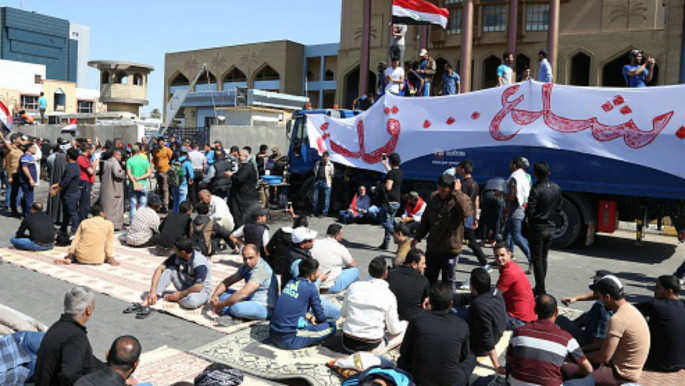Sadr supporters begin planned sit-in outside Baghdad's Green Zone
Protesters surrounded three entry points of the Green Zone where they set up tents, The New Arab's correspondent reported on Friday.
The security forces attempted to prevent supporters of the influential cleric from closing in on the fortified zone, but protesters pushed past checkpoints and set up camp.
"The sit-ins have started in front of the Green Zone gates as a message to the corrupt people who live there," Ibrahim al-Jaberi, a local official from Sadr's movement, told AFP.
The protest will continue "until our demands for profound reforms" are met, said Kazem al-Issawi, spokesman for the Sadrist movement.
Although bridges leading to the fortified complex, which homes the country's political elite and most of the city's foreign embassies, were closed to traffic and pedestrians on Friday morning, hundreds of Sadr supporters were able to march through.
Iraqi Prime Minister Haider al-Abadi has ordered an inquiry to investigate how supporters broke through the forces' security barriers and barbed wires surrounding the Green Zone, an Iraqi military source told The New Arab.
 |
| Hundreds stage a sit-in outside Green Zone defying the government's orders [Anadolu] |
Iraq's ministry of interior issued a statement ahead of the planned sit-in on Thursday night calling the protests "unauthorised."
Supporters of Sadr have held a series of mass rallies across central Baghdad, with tens of thousands turning out last week for the latest protest to press their demands.
Sadr urged his supporters last week to prepare tents for a protest camp set to begin Friday and last ten days - when an ultimatum he gave the government to implement reforms passes.
In the protest that he attended in Baghdad three weeks ago, Sadr threatened that his supporters could storm the Green Zone if their demands were not met.
On 9 March, Abadi said on Twitter that he was about to announce a cabinet reshuffle.
Abadi has spent months trying to pass a raft of reforms, cracking down on corruption, reducing the size of government and tackling nepotism - but his efforts have largely been blocked by other parliamentarians, mostly supporters of former prime minister Nouri al-Maliki - and it seems protesters' patience is growing thin.
Although Sadr is a leading Shia cleric and has been linked to militias accused of killing Sunnis, he has avoided sectarian rhetoric and worked on a more populist programme.
Sadr demands land and free electricity for poor Iraqis, while calling for top officials' salaries to be cut in half.
These demands have won him popular support among working-class Iraqis, who have rallied behind his call to bring down the government.

![Palestinians mourned the victims of an Israeli strike on Deir al-Balah [Getty]](/sites/default/files/styles/image_684x385/public/2024-11/GettyImages-2182362043.jpg?h=199d8c1f&itok=xSHZFbmc)


![The law could be enforced against teachers without prior notice [Getty]](/sites/default/files/styles/image_684x385/public/2178740715.jpeg?h=a5f2f23a&itok=hnqrCS4x)
 Follow the Middle East's top stories in English at The New Arab on Google News
Follow the Middle East's top stories in English at The New Arab on Google News

![Palestinian journalists in West Bank [Getty]](/sites/default/files/styles/image_330x185/public/2167088057.jpeg?h=a5f2f23a&itok=smdkN-46)
